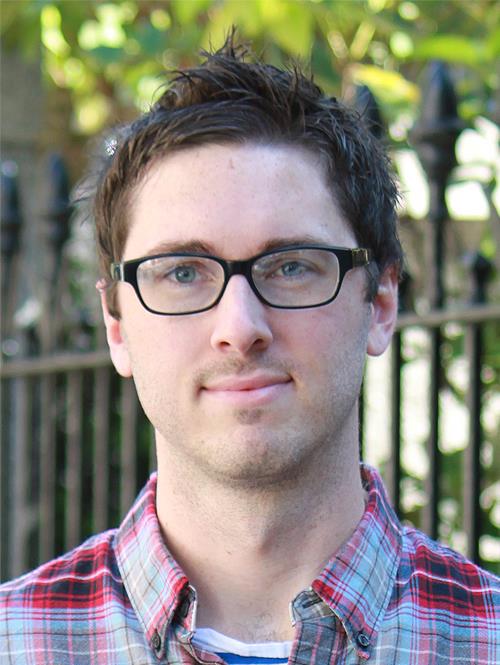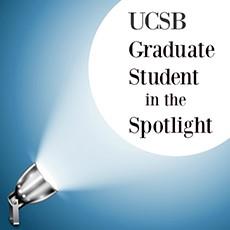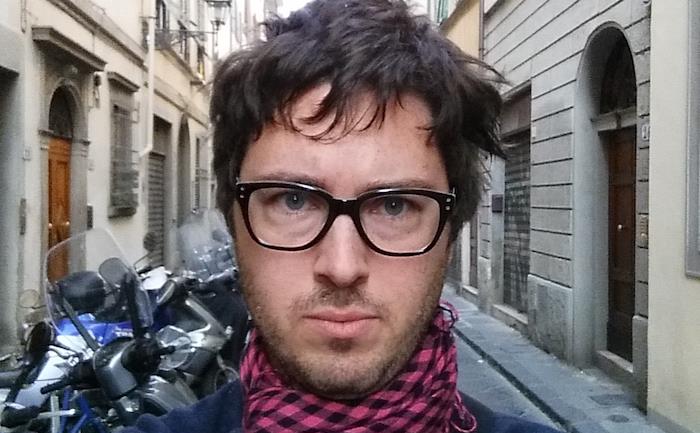Top Stories
Our Graduate Student in the Spotlight is on Brian J. Griffith, husband and father of two and a fourth-year Ph.D. student in History. He is studying Modern Italy and Italian Fascism, and has received a GSA Excellence in Teaching Award.

 Our latest Graduate Student in the Spotlight column focuses on Brian J. Griffith, husband and father of two, and a fourth-year Ph.D. student in History, who is studying Modern Italy and Italian Fascism. He was also a recipient of the GSA Excellence in Teaching Award in 2014.
Our latest Graduate Student in the Spotlight column focuses on Brian J. Griffith, husband and father of two, and a fourth-year Ph.D. student in History, who is studying Modern Italy and Italian Fascism. He was also a recipient of the GSA Excellence in Teaching Award in 2014.
What would people be most surprised to know about you?
I used to play guitar for a Bay Area punk-rock group called The Drive Home. We put out a few records and did some extensive touring throughout the western half of the United States before disbanding in 2004. In addition to making a lot of really good memories, I learned a lot about hard work, dedication, and doggedly pursuing my personal or professional objectives over the long-term. Despite my band's dissolution, those experiences and skills, I think, have really helped me during the course of my graduate training.
 What is your biggest accomplishment in life and why?
What is your biggest accomplishment in life and why?
The personal, or intellectual, obstacles that I've had to overcome in order to be studying and working here at UCSB, I think, constitute my greatest accomplishment. Prior to my intellectual awakening, I had largely failed my way through my high school years. As a result, I emerged as an early "adult" with very little intellectual foundation. And I really sensed my personal inadequacies vis-à-vis my peers. But after watching so many of my friends and loved-ones begin, and complete, their degrees, I was inspired to go back to school. I suppose you could say I had a positive intellectual context around me for many years, which reinforced my inherent curiosity and productive energies. And once I set my mind on, first, earning my B.A., I did it. And then I completed an M.A. two years later. And then I was invited to study here at UCSB for my Ph.D. in 2012. When I look back on all of these milestones, I realize how far I've come personally. This, for me, is my greatest accomplishment.
 You won a GSA Excellence in Teaching Award in 2014. Any teaching tips you can hand down?
You won a GSA Excellence in Teaching Award in 2014. Any teaching tips you can hand down?
I'd say that if you're passionate about what you're teaching, then let it show in your classroom. I come to every section meeting, every lecture excited - genuinely excited - for whichever topic we'll be reviewing together. I don't think that studying and teaching History is just enjoyable; I think it's important. And I utilize that sense of importance, and urgency, as an inspiration for getting my students excited and engaged. I think if you can develop ways for helping your students discover their hidden passions for your discipline, you'll likely make a significant impact in their academic and, possibly, even personal lives.
What do you wish you had known before you started grad school?
Thankfully, I was pretty well prepared for the realities of graduate-level professional training prior to starting my M.A. and Ph.D. programs. I think anyone considering a graduate program should be prepared to put their heart and soul into what they're doing for two to seven years, depending on the degree(s) they're pursuing. It's quite difficult to pursue an M.A. or a Ph.D. program with a lukewarm attitude. You should be burning with passion and dedication for what you're doing or you'll likely find yourself overwhelmed and prematurely burnt out. Graduate programs are briskly paced, which can be a challenge for some people. But I can say from personal experience that that brisk pace, over the long term, will compel you to grow both as a scholar and as a person.

What is your favorite thing you do to relax?
I live only 15 minutes from the beach, so I like to take walks or bike rides out to the nearby bluffs with my family. I also enjoy gardening, playing my guitar and accordion, and watching old Italian films (preferably a Fellini or a Rossellini) over a nice glass or three of Chianti Classico.
What's in high rotation on your playlist these days?
Lately, I've been listening to The Misfits and Django Reinhardt.
"It's quite difficult to pursue an M.A. or a Ph.D. program with a lukewarm attitude. You should be burning with passion and dedication for what you're doing or you'll likely find yourself overwhelmed and prematurely burnt out." - Brian Griffith
How would you best describe your research to someone who wasn't in your field?
My current research explores the intertwining of viti-viniculture (table and wine grape production), autarkic (materially self-sufficient) consumerism, the physical environment, and identity construction in interwar Italy.
 My dissertation - Bacchus' Blackshirt - analyzes the centrality of Italy's viti-viniculture industry within the Fascist regime's intertwined campaigns for encouraging the development of a national identity in Italy and establishing a synchronized community of popular consumption under the auspices of the Corporatist State. Since grape vine cultivation was such a widespread practice in Italy, it offered the dictatorship an agro-cultural platform for projecting its socio-economic program to the Italian masses.
My dissertation - Bacchus' Blackshirt - analyzes the centrality of Italy's viti-viniculture industry within the Fascist regime's intertwined campaigns for encouraging the development of a national identity in Italy and establishing a synchronized community of popular consumption under the auspices of the Corporatist State. Since grape vine cultivation was such a widespread practice in Italy, it offered the dictatorship an agro-cultural platform for projecting its socio-economic program to the Italian masses.
By promoting Italy's winemaking heritage via popular campaigns and outreach, I contend the regime aimed to stimulate domestic consumption of Italy's grapes and wines and, simultaneously, to impress upon the masses that Italians, regardless of their regional affiliation and geographical separation, shared these histories and practices as a singular patrimony. In doing so, I am arguing, Mussolini's dictatorship hoped to motivate domestic consumers to recognize themselves as Italians.
What do you hope to be doing 5 or 10 years out of graduate school?
Like most starry-eyed Ph.D. candidates, I hope to be working as Professor of History at a four-year university. However, in light of the unfavorable job market out there, many feel compelled to begin planning for options B and C.